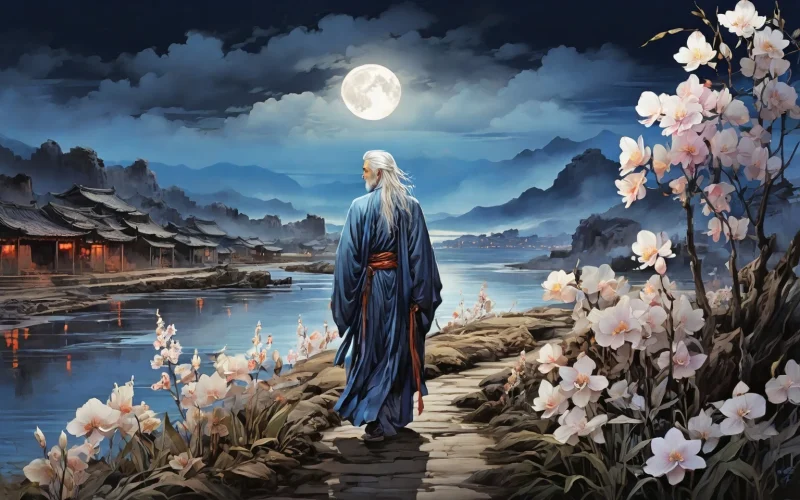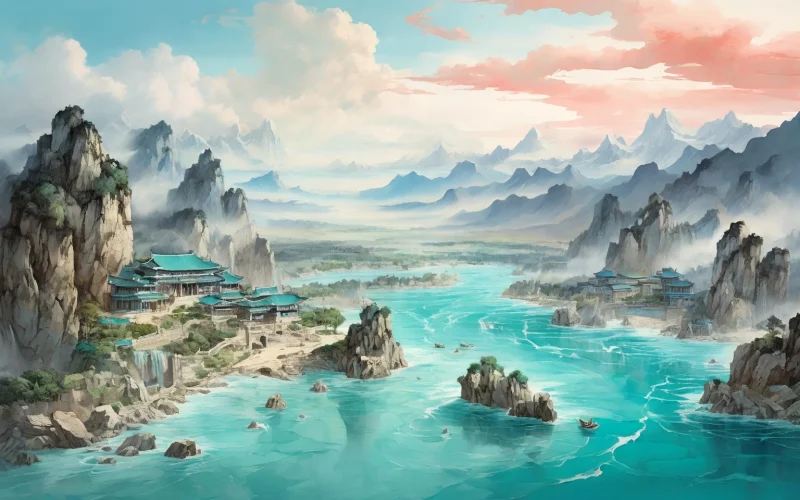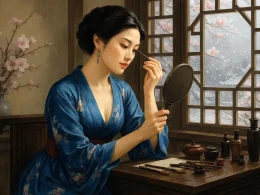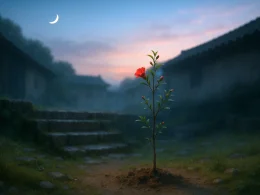The emperor was gone just like his autumn breeze;
At night his steed would neigh, at dawn no trace was seen.
By painted rails fragrance still wafts over laurel trees,
His thirty palaces overgrown with mosses green.
Wei eunuch drove a dray to go a long, long way;
In Eastern Pass the sour wind stung the bronze's eyes.
Only the moon of yore saw him leave palace door;
Thinking of his dear lord, he shed tears and heaved sighs.
Withered orchid would say, "Farewell and go your way."
Heaven would have grown old if it could feel as man.
He went with moon-shaped plate beneath the moon desolate;
The waves unheard, far from the town the horses ran.
Original Poem:
「金铜仙人辞汉歌」
李贺
茂陵刘郎秋风客,夜闻马嘶晓无迹。
画栏桂树悬秋香,三十六宫土花碧。
魏官牵车指千里,东关酸风射眸子。
空将汉月出宫门,忆君清泪如铅水。
衰兰送客咸阳道,天若有情天亦老。
携盘独出月荒凉,渭城已远波声小。
Interpretation:
This poem is one of the representative works of the Tang Dynasty poet Li He, composed in 813 CE (the 8th year of the Yuanhe reign of the Tang Dynasty). At that time, Li He, suffering from illness, resigned from his position as Ceremonial Attendant and wrote this piece on his journey from Chang'an to Luoyang. The poet uses the story of the golden bronze immortal being removed from the Han palace as the main thread, expressing nostalgia for the prosperity of the Han Dynasty under Emperor Wu and lamenting the fall of the empire. Meanwhile, the poem also conveys Li He’s complex emotions as he left office and departed from the capital. The poem, with its imaginative narrative and profound emotions, intertwines the grief for the nation’s fate with personal sorrow, making it a masterpiece.
Part 1: Lamenting the Fleeting Glory
“茂陵刘郎秋风客,夜闻马嘶晓无迹。"
(The spirit of Emperor Wu of Han, like a fleeting guest in the autumn breeze, seems to return to his Maoling tomb, where horse neighs echo in the night, but vanish with the dawn.)
Through the imagined return of Emperor Wu’s soul between his tomb and the Han palace, the poet illustrates the fleeting nature of life and glory. The imagery of "a guest in the autumn breeze" conveys both the emperor's ephemeral brilliance in history and the poet's reflection on his own transient fate.
“画栏桂树悬秋香,三十六宫土花碧。”
(The painted railings of the palace are adorned with fragrant osmanthus trees in autumn, while moss covers the ruins of thirty-six imperial residences.)
The poet paints a picture of desolation, depicting the ruins of imperial grandeur to emphasize the relentless passage of time and the inevitability of decline.
Part 2: The Immortal’s Sorrowful Departure from the Palace
“魏官牵车指千里,东关酸风射眸子。”
(Officials from Wei lead the cart carrying the bronze immortal far away, while the bitter wind from East Gate seems to sting the immortal's eyes.)
By personifying the bronze immortal, the poet imbues it with deep emotions, allowing it to feel sorrow for being exiled from the Han palace. The “piercing wind” both physically and emotionally amplifies the pain of separation.
“空将汉月出宫门,忆君清泪如铅水。”
(As the bronze immortal leaves the Han palace, only the moon accompanies it, and it weeps tears of longing for Emperor Wu as heavy as molten lead.)
The “tears as heavy as molten lead” vividly convey the immortal’s deep sorrow, intensifying the sense of grief for both the lost dynasty and the inexorable passage of time.
Part 3: The Desolation Along the Way
“衰兰送客咸阳道,天若有情天亦老。”
(On Xianyang Road, withered orchids bid farewell to the bronze immortal, and if the heavens had emotions, they too would grow weary of life.)
Through imagery of desolation and the idea of the heavens growing old, the poet expresses a profound lament for the impermanence of both nature and human endeavors. The line “if heaven had feelings” stands as the poem’s most poignant and reflective moment.
“携盘独出月荒凉,渭城已远波声小。”
(The bronze immortal, carrying its tray, travels alone through the desolate moonlit landscape. The sounds of the river near Weicheng grow quieter as it journeys further away.)
This concluding couplet vividly portrays the immortal’s solitude and despondency, mirroring the poet’s own feelings of loneliness and resignation.
Writing Features:
- Imaginative Narrative: The poem uses the bronze immortal as a narrative thread, blending its emotions with historical events to express sorrow for both the nation and personal circumstances.
- Emotion and Imagery Intertwined: The poet seamlessly integrates emotions into vivid descriptions of natural scenery, enhancing the emotional resonance.
- Precise and Unique Language: Words like "piercing wind" and "tears like molten lead" create striking and memorable imagery with layered meanings.
- Well-Structured: Divided into three parts, the poem transitions smoothly from the desolation of the Han palace to the immortal’s sorrowful departure, and finally to the loneliness of the journey, creating an emotional progression.
Overall Appreciation:
This poem blends the narrative of the bronze immortal’s removal from the Han palace with the historical backdrop of Emperor Wu’s reign and the fall of his dynasty. The opening lines lament the fleeting nature of life, the middle section depicts the sorrowful separation of the immortal, and the closing verses highlight the desolation of its journey. The poem reflects both the poet's grief for historical decline and his personal disillusionment. Combining imaginative storytelling, historical reflection, and emotional depth, the poem stands as a quintessential example of Li He’s poetic brilliance.
Insights:
This poem reminds us of the impermanence of glory, whether in history or in personal endeavors. It evokes a profound philosophical reflection on the transient nature of life and the inevitability of decline. At the same time, it encourages a broader perspective on life’s uncertainties, urging us to focus on spiritual pursuits rather than material success. Through its evocative imagery and poignant narrative, the poem invites us to embrace life’s impermanence with resilience and grace..
Poem translator:
Xu Yuan-chong (许渊冲)
About the poet:
Li He (李贺), circa 790 - 817, was a native of Luoyang, Henan Province, and a Romantic poet of the Middle Tang Dynasty.












